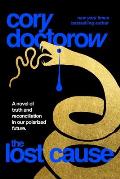Tag: Star Trek
Bright spots
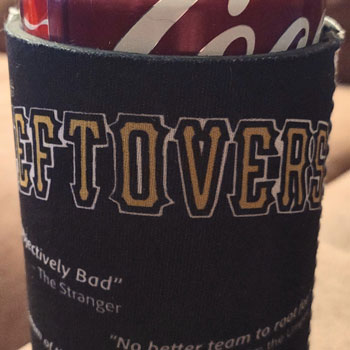
Gifts from the field
Though my climb back to stable orbit continues, it's been slow going and I've not gotten a lot accomplished of late. But there have been a few highlights that perked me up a bit:
- Mizuki went in to see the vet yesterday and was a champ. Scared out of her little kitten mind, but bravely got through being groped and stuck with needles and she's now had all her shots until next year. She was very popular with Dr. S and the whole staff at Cats Exclusive and I have to admit I liked it when she ran from the technician back to me when they were done with the shots. Don't worry, Tiny Moon, I've gotcha.
- I umpired a playoff series the other night, three games, and when one of the guys playing in the second game showed up early he saw I was the ump for the night and texted his teammates: "We got Tim tonight!!" It did me good, I wasn't feeling too well before heading to the park. That team won their semifinal but lost the championship game to a squad that also knows me by name now. The softball season is coming to a close soon, but meanwhile it's nice to be appreciated there.
- Relatedly, last week (or sometime? The days have all melded together lately) I umped another game with The Leftovers, who presented me with a team-branded beer cozy. I don't drink beer, but it functions as a Coke cozy just fine and I discovered they name-checked me on the thing:
That's pretty great. Many thanks to Neal and the rest of the team.
- Lower Decks is back! The new season got off to a pretty good start, not the best but still fun. I guess if you're a Voyager fan you'd appreciate it more, but that to me is the bad Trek. On the other hand, they made great fun of some of the goofiest/dumbest things about that series, so that's a plus. I see this LD ep as less of a "valentine" as a well-deserved mockery of some really terrible Star Trek.
Hollywood on strike
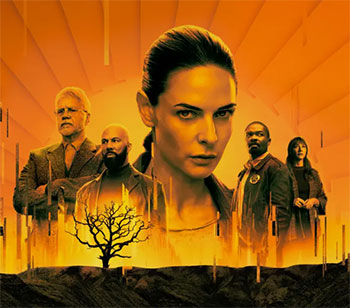
I just started "Silo," so it's not on my list yet, but it might get there. So far so good.
With the Writers' Guild of American and the Screen Actors Guild both on strike—for very good reasons I wholeheartedly support, for whatever that's worth—we likely won't be getting much in the way of new TV for a long while. Nothing good, anyway; I'm sure there will be lots of brainless unscripted "reality" garbage and revivals of old game shows galore, but the real stuff we look forward to might be off the menu for the duration of what could be a lengthy battle with studio greed and exploitation.
So what to do in the interim? If you're like my dad, nothing changes; he doesn't watch much TV outside of news. But if you're like many of us, you'll need to find something to fill your entertainment hours. For those sorts, I have recommendations.
There's been so much quality programming out there since the streaming era dawned and chances are you've missed some of it. I'm sure I have too, so if you like something that I don't mention below, say so in the comments and maybe I'll give it a look.
But these shows are gold. They might not all be your personal cup of tea, but the quality of production and writing in them are top-notch. So add these to your streaming queues if you've not already partaken:
-
The Orville. Seth MacFarlane's tribute to Star Trek was on network for two seasons, then on a long hiatus, then on Hulu for a year, now in a limbo that began after its Hulu season completed last year. After a pilot episode that was made more for Fox executives than anyone else—it has far more in the way of lowest-common-denominator juvenile humor than does the series proper—it really took flight and became one of the best genre shows ever made. It's ostensibly a comedy, but in the best Trekkian tradition its stories mirror our social and political issues of the day, from trans rights to social media to misinformation campaigns to the evolution of artificial intelligence. And there's some pew-pew-pew in there, too. The first season didn't get great critical acclaim, but I suspect that's mostly due to the pilot episode trying to fool the execs into thinking this would be more like "Family Guy" Seth MacFarlane than Star Trek nerd Seth MacFarlane; years two and three did get all sorts of praise, but still no renewal decision. It's an expensive show to make, and the streaming landscape is finding its footing after too many services flooded the market, but I'd sure rather have more seasons of The Orville than just about anything else Hulu/Disney greenlights. All three seasons of The Orville can be seen on both Hulu and Disney+.

Please, go watch this show and help get it renewed. Even if "you are small and feeble and do not possess the necessary intelligence." -
For all Mankind. This awesome alternate-history drama from the wondrous mind of Ronald D. Moore (DS9, Battlestar Galactica, Outlander) postulates that the Americans were beaten to the moon by the Soviet Union in 1969. From that point, history diverges from what we know and the race to the moon becomes the plan to occupy the moon becomes the push to go to Mars, with the full Cold War backdrop and all the mistrust and politics and secrecy that goes with it. The show focuses on NASA and a core group of characters there, but in the background we also see bits and pieces of significant events going differently, from presidential elections to a Beatle reunion to a very different type of technological advancement than what we've lived through in our reality thanks to a never-mothballed space race. Each season begins with a time jump of roughly ten years, so we get the ’70s in season 1, the ’80s in season 2, and the ’90s in season 3, with a tease for season 4 in the 2000s, which at last report was in post-production (so maybe we'll get to see it even with the strike on?). It is brilliant and deserves all its accolades and more. For all Mankind streams on Apple TV+.
-
Severance. Imagine the ultimate work/life balance. That's the premise of Severance, which follows Adam Scott's character Mark Scout into a new job as a "Macrodata Refinement" worker at Lumen Industries that requires him to undergo a procedure that separates his mind into two parts: One for work (or, the "innie" persona), one for home (the "outie"). How the personas diverge and differ becomes one part of the drama while the other revolves around just what mysterious job Mark and his team are doing for Lumen. Creepy and fascinating, the writing is amazing and the performances are great, not just form Scott, but Christopher Walken, Dichen Lachman, John Turturro, Patricia Arquette, really everyone in the thing. Season two was nearing completion when the strike hit, but season one is ready for your viewing enjoyment on Apple TV+.

"I am certain you will remain with me in spirit, in some deep and yet completely unaccessible corner of my mind." -
The Diplomat. Keri Russell's come along way from her Felicity days. Here she plays a reluctant U.S. Ambassador to the United Kingdom, navigating political intrigue, a possibly corrupt Prime Minister, machinations from the U.S. President (Michael McKeon)'s team to draft her as a replacement for the Vice President, and a former State Department husband (Rufus Sewell) that can't help but stick his nose in where it isn't wanted. Just the one season so far, on Netflix.
-
A League of Their Own. This remake/reinterpretation/spinoff of the Geena Davis/Tom Hanks film of the same name follows the Rockford Peaches of the World War II-era All American Girls Professional Baseball League. Its first season was terrific, with a lot more drama and depth (and queerness) to the characters than was possible in the 1990 movie, and I was really looking forward to season two. Then the suits at Amazon Prime cut the season order down to four episodes and declared that would be that, effectively cancelling it with a little going away gift that Collider likens to a mere participation ribbon and a slap in the face of the show's passionate viewership. But this is Amazon we're talking about, and face-slaps might be the best one can expect from such a predatory corporation. If you've got Prime, great, watch it there. If you don't, well, there are workarounds and f%#& Amazon.
-
Star Trek: Picard season 3. I, of course, have very high standards when it comes to Star Trek programming, which is why I specify "season 3." Seasons 1 and 2 both start out strong, with 1 falling apart right near the end of the ten episode run and 2 going off the rails about halfway in. They're still enjoyable, if flawed, and there's stuff in those episodes that informs some of season 3, so if you're a completist, by all means, just beware of plot holes. On the other hand, season 3 is a masterpiece and a wonderful coda for the Next Generation characters. It's not to be missed. Written and produced by massive Trek fans, notably showrunner Terry Matalas, it does presume the viewer has knowledge of at least the basics of Trekdom, so if you go in cold it might be a challenge; still, not to be missed. Streaming on Paramount+.

Why showrunners have not been running over each other to woo Jonathan Frakes to direct their shows is beyond me. Frakes is fantastic. -
Star Trek: Strange New Worlds season 1. Similarly, the prequel series featuring Captain Pike and the crew of the pre-Kirk USS Enterprise is wonderfully good. I specify season 1 here just because it's consistently terrific from start to finish (though I do have a couple of quibbles, mostly Gorn-related), while the currently-running season 2 hasn't been as impressive, at least to me. Not that it hasn't tried; there have been some ambitious things tackled in the current season and it's also worth your time, but year 1 is so solid that it gets an isolated shoutout. (I would also include the entirety of the animated Star Trek: Lower Decks in this list, but for that one you really do need to be a hard-core Trek nerd to truly appreciate it in all its glorious goofiness.) Paramount+.
-
Outlander. It's a time-travel romance novel on television. Once you accept that, you can enjoy it for its quality of production and character and historical depth while overlooking (or not) the co-lead being a hunky guy that might as well be the model for every Harlequin bodice-ripper book cover (he's a good actor, so just run with it). I gravitated to it because it was developed by the aforementioned Ronald D. Moore, who, as we've established, is awesome. The story follows Claire, who finds herself mysteriously transported from the 1950s to the 18th century in Scotland. Over the seasons, the locale shifts from UK to France to the American colonies in the runup to the Revolutionary War. It's fun, well-made, a little sexy and a lot violent in an historically appropriate way. The first five seasons are on Netflix, the sixth is on non-US Netflix, and the current year 7 is running on Starz.
-
Ted Lasso. Just completed, this series spans three seasons of the title character helming a British soccer—excuse me, football—club despite being an American who goes in knowing nothing about soccer. This show is a kind of antidote to cynicism and negativity in the world. Ted, despite his own personal turmoils, is the nicest human being that ever lived and brings out the best in everyone around him. The third and final season isn't quite as great as the first two—or maybe it is?—but the whole thing start to finish is a delight. Streaming on Apple TV+.
- The Big Door Prize. This is a weird mashup of shows—it's got a little Schitt's Creek, a little Twilight Zone, a little Freaks and Geeks—but it's utterly charming in its own right. A small town is turned upside down by the arrival of a machine that you might find in an arcade or on a boardwalk that claims to tell each person their "true life potential." This goes over very well for some townfolk, not so much for others. It stars Chris O'Dowd, who is brilliant as ever, alongside a bunch of actors I wasn't familiar with but who all ably embody quirky fun characters in a ridiculously diverse burgh in, presumably, middle America. Season 1 is streaming now; season 2 had already finished filming when the strike hit, so we might get that soon as well. Apple TV+.
Other recent/current shows are also worth a look—Only Murders in the Building, Hello Tomorrow, Russian Doll, plenty of others—but those listed above are my cream of the crop. Of course, even I have not seen everything. What are some of your faves from the last couple of years? Sound off and let me know.
No Comments yetThe Grim Reaper comes for all
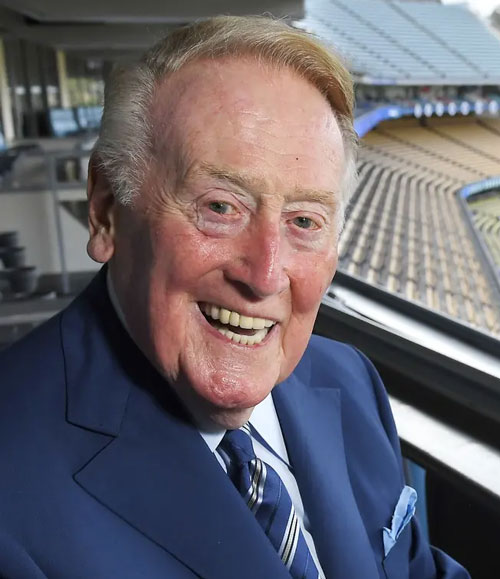
Vin Scully
I know, that's a morbid, depressing headline. But it's true, and as one gets older—and as I personally can no longer pretend I'm not firmly within middle age—the people in the world who leave us are more and more often people we have a personal connection with in some fashion. At 53, I'm not in the stage where I'm scanning the obits for people I know or anything, but I am in the stage wherein the public figures that reach their ends are a kind of contemporary.
Recently there have been a couple of those for me, and, naturally, my friend Erik beat me to the punch in writing up reflective memorials for them and I can't improve on his remarks. But I will say a little bit anyway.
For the great Vin Scully, longtime broadcaster for the Los Angeles (and before that the Brooklyn) Dodgers, who passed away on August 2nd at age 94, Erik noted the achievement of sheer longevity Scully accomplished thusly:
One of the first games he broadcast for the Dodgers, when he was a mere stripling of 23 in 1950, was an exhibition game against the Philadelphia A's, managed, in his final year, by Connie Mack, who had been born in 1862, just after the Battle of Fredericksburg. So just those two men connected the U.S. Civil War to the present. Remarkable. If you want to put it in baseball terms: Connie Mack began playing professional baseball in 1886, and managed professional baseball from 1894 to 1950, at which point, at that exhibition game, you can imagine him tagging off to Vin Scully, who broadcast professional baseball games another 66 years. So it's 1886 to 2016. That's the entirety of the sport, really.
Vin was my introduction to baseball entertainment. I grew up in a minor-league town, where there was a Triple-A team affiliated with the Astros (and Rangers before that) and where the local TV station occasionally ran Padres games, but the local radio ran Dodger games. Nearly every night (or afternoon) in the spring and summer I could tune in to AM 1400 and hear the almost musical phrase, "It's time for Dodger baseball" in the dulcet tones of Vin Scully, followed by "a very pleasant good afternoon to you wherever you may be."
I never was a Dodger fan, but I was always, always a Vin Scully fan. There are/have been other good baseball play-by-play pros—your Jon Millers, your Gary Thornes, your Dave Niehauses—but there has ever only been one Vin Scully; no one has ever been as good at that job. Vin not only narrated the game for you, he made it art. He (and presumably his staff of minions) prepared so meticulously for every broadcast that he had stories about even the most no-name of journeyman callups to relate during breaks in the action. He famously lip-read arguments on the field between managers and umpires, substituting creative metaphors for the swear words when he interpreted for the radio audience. (My favorite of Vin's substitutions was “'that's fertilizer,' Lasorda yelled, ‘100% fertilizer.’”) He made the most inconsequential blowout game between teams long eliminated from the pennant chase entertaining.
Vin was also the regular TV guy on the NBC Game of the Week for much of my growing-up years, setting my standard for televised games as well as radio. He had a decent repartee with color commentator Joe Garagiola on NBC, but he was always best as a solo act, just chatting with the listener one on one. Or, as he put it himself, "I tried to make believe I was in the ballpark [grandstands], sitting next to somebody and just talking." In modern times, when thanks to the Internet and MLB.TV one had a choice in such things, when I had the option of watching a game with the Dodgers' broadcast feed or the opposition's, I would always choose the Dodger feed because of Vin. Heck, sometimes I would tune in Dodger games as background noise while doing something else, just for Vin.
Scully was the best for a lot of reasons, but one key element was a sense to know when to stop talking and let the moment speak for itself. He described his approach to the gig this way: "The game is just one long conversation, and I'm anticipating that, and I will say things like 'Did you know that?' or 'You're probably wondering why.' I'm really just conversing rather than just doing play-by-play. I never thought of myself as having a style. I don't use key words. And the best thing I do? I shut up."
Erik lists some favorite Scullyisms—“Bob Gibson pitches like he's double-parked”—but there have been so many that I both heard myself and read quoted by others that I couldn't pick favorites. But there is one that resonates more and more in my middle-age, from a game Vin did between the Dodgers and the Cubs in the late '80s and regarding the Cubs' slugging outfielder: "Andre Dawson has a bruised knee and is listed as day-to-day. Aren't we all?"

Nichelle Nichols
The other obit from this month that hit my world was that for Nichelle Nichols, famous for portraying Lieutenant Uhura on the original Star Trek, who died at 89 years old. Erik again has a better tribute. As a champion-level Star Trek nerd I of course know all the oft-told stories about Nichelle and her Trek history—how Martin Luther King Jr. convinced her to remain with the show when she was thinking of leaving; how she inspired Whoopi Goldberg and plenty of other young African-Americans just by portraying a competent professional on network television; how she didn't know ahead of time that her audition for Star Trek was for her former affair partner, Gene Roddenberry, whom she left because she didn't want to be the "other woman"; how Bill Shatner sabotaged the alternate-take filming of the alleged "first interracial kiss" scene with her, insisted on by network suits, to ensure that the kiss would make it on air despite NBC's worries about alienating racists in the South—and how she turned being typecast as Lt. Uhura into a way to reach out to the scientific community, working with NASA on minority outreach and recruiting several applicants who would become prominent astronauts and administrators for the agency (including shuttle astronaut Mae Jemison, the first Black woman in space, who "returned the favor," as it were, and appeared as a transporter chief on an episode of Star Trek: The Next Generation).
I never met Nichelle personally despite seeing her in person at a number of conventions. I've never been an autograph hound or anything like that, so didn't wait in line to speak with her and have her sign stuff, but I did enjoy her appearances and the occasions she would close out her bit with a verse or two of "Beyond Antares."
A class act, a quality human, and a loss to the world.
Nichelle had been in poor health for a while, it wasn't a shock to learn of her passing, but it still gave me a sad, as the kids say. We've now lost De, Jimmy, Leonard, Majel, and Nichelle from the original core crew, not to mention Rene Auberjonois and Aaron Eisenberg from Deep Space Nine.
I'm at that age. The obits are more often for folks that were somehow important to me now.
(Oh, and to answer Erik's question, Nichelle's character of Uhura got her first name, Nyota, non-canonically in novels in the '80s; it was only in the J.J. Abrams movie of 2009 that it was first used on-screen. Fanfiction attempted to name her "Penda" previously, but we can all agree the final choice was the better one.)
No Comments yet"Star Trek: Picard" season ends in disappointment

"I read once that a commander has to act like a paragon of virtue. I never met a paragon."
"Neither have I."
—Eve McHuron and Captain Kirk, "Mudd's Women"
It's been a week now since the first season of Star Trek: Picard came to a close and I've almost gathered my thoughts about it. They're a bit muddy and uneven. It started out so well—or, at least, it set up some great plot elements with terrific dialogue and character writing. And as things progressed through the ten-episode run, it built on them nicely—until they stopped.
The final few episodes were just a letdown. Not entirely; there's good stuff in all of them, but there's also some lazy maguffiny stuff. More importantly, some of those really interesting setups were just resolved with a throwaway line of dialogue or ignored altogether. It's like they hit episode 6 and then realized that they were past the halfway mark and oh crap now what do we do with all this stuff?
It's extra disappointing because Michael Chabon was the showrunner and I love Michael Chabon. Brilliant novelist. Great with characters. Knows his Star Trek. And yet this kind of fell apart. Star Trek: Discovery also suffered from some of this same kind of trouble in its first two seasons, though, and there is a common element on the staff: Executive producer Alex Kurtzman. Is it his fault? Maybe. But I always default to blaming him because he worked on the J.J. Abrams movies, which cared not a whit for what makes Star Trek good.
Picard sets up these big issues in its premise, with the Federation having abandoned their rescue/relief mission to save their historical enemies the Romulans from the Romulan system's impending supernova, a decision made at least in part because of a massacre at a Mars shipyard by android laborers. The fallout from the massacre included a ban on all synthetic lifeforms, something Jean-Luc Picard, of course, vehemently opposes. The abandonment of the mission and the synthetic ban lead to his resignation from the fleet and a lot of personal drama and trauma. So when none of this is satisfactorily paid off, it's a humongous failure of the writing staff.
The android attack was, unsurprisingly, engineered by secretive paranoid Romulans even though it harmed their own interests. This is pursued and builds to the greater threat that the season hinges on, all great, but then the resolution is a big nothing. The secret paranoid Romulan anti-android cult is not only not satisfactorily explained—they basically just come off as stupid dupes enthralled by ancient stories—but as they are about to wipe out the android population at the secret hiding world, deus ex machina appears in the form of Acting Captain Will Riker and a fleet of UFP ships that intimidate the Roms into simply retreating, and then they leave too, apparently never to return, which makes zero sense. But this confrontation is apparently all it takes for the Romulans to give up on their zealotry and for the Federation government to rescind their now-15-year ban on androids when they wouldn't hear of it before, and we get no details on it. It's just an expository line of dialogue, "oh, and the ban is lifted, so all is good now!" Say what? How?
Where's the dramatic scene that shows how the government overreaction played into terrorism and was self-defeating, providing a valuable lesson to be learned about not abandoning principle out of fear and ignorance? I'm not saying we need a hit-us-over-the-head teaching moment ala "Let That Be Your Last Battlefield," but this was supposedly the underlying theme of the whole season. From Picard fighting Starfleet and his government on their bad decisions to seeking out the sleeper-agent-type android Shoji to exploring the victimhood of the Borg and the potential redemption (and exploitation) of the XBs (ex-Borg) to the myriad references to our beloved Mr. Data, it's not unreasonable to expect the story to resolve itself around this theme. Instead we just got some big action stuff (along with one truly brilliant and touching scene of character depth), a bit of a troubling introduction of a new technological and storytelling element that will in a broad sense have to be ignored lest it completely change Federation culture (much like J.J. Fricking Abrams did with magic blood reversing death in the abominable Star Trek Into Darkness), and all the loose ends and forgotten plot points.
I gather from stuff I read on Twitter, that infallible source of reality and facts, that the Riker scene was a late change. It was supposed to have been Admiral Clancy, who we saw Picard argue with in the early episodes, that came to the rescue and that, perhaps, might have mitigated some of the lost opportunity issue with the fleet and government having to acknowledge and rectify their errors. Or not.
Sigh. I have high expectations for my Star Trek. And this show had a lot going for it, not the least was Chabon and his gift for character and dialogue—which were well used, no doubt; I loved (for the most part) the episode set at the Riker/Troi home. But pacing the plot, creating drama by needlessly killing characters off (RIP Hugh, loads of XBs, Maddox), working in more needless death in the form of Riker and Troi's deceased son (killed by a disease made incurable only by the synth ban—what? dumb), just ignoring the broader ramifications of your whole theme... Fucking Kurtzman. (I will continue to blame him until there's evidence pointing elsewhere.)
I gripe because I care. I love Star Trek, I want it to live up to its own high standard, and when it fails it's a blow.
Oh well. At least this show isn't Voyager.
No Comments yetBut is it Star Trek?
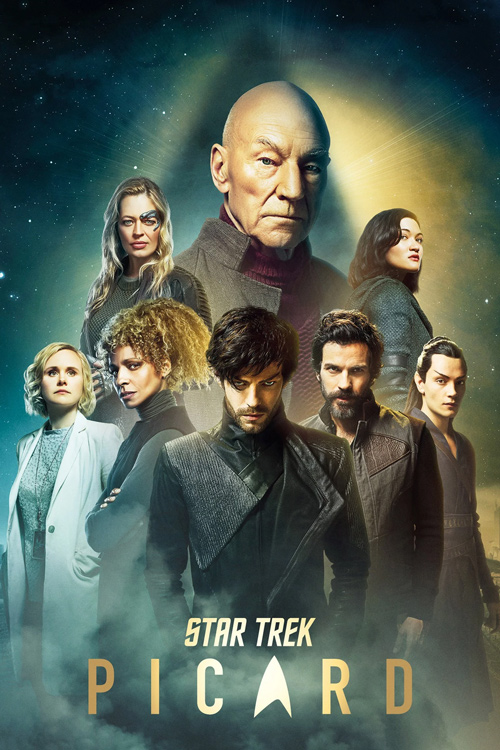
Last month the latest Star Trek series premiered and, naturally, I have thoughts.
Like the other currently-in-production series, Star Trek: Picard is a streaming-only, online-delivered product doing its part to make Lt. Cdr. Data's declaration that television as we've known it will only last until about 2040 come true. To save ourselves a bit of coin, some friends and I get together to watch episodes here, depriving CBS of several individual subscription fees. (They're doing OK, though.)
There is a difference of opinion about this show. Both in my Trek Night posse and in the wider culture. Some, even, in my own head. It's a complicated production. By and large it seems accepted that the show is a good piece of sci-fi, but does it rise to the level of Star Trek?
It's the same criticism that Star Trek: Discovery gets. On Discovery it's a more understandable complaint. They chose to play fast-and-loose with established canon in a prequel series and had to do some damage control on it; they canned the initial showrunner, Bryan Fuller, who is a huge fan and knows his Trek, and gave it to Alex Kurtzman, who, fairly or unfairly, has the taint of J.J. Abrams on him from their collaboration on the feature films Star Trek (2009) and Star Trek Into Darkness, both of which were decidedly not up to Trek standard and the latter of which is a truly awful piece of work; and while the correctives in the second season were welcome, the show still has a bit of a doom-and-gloom aspect to it that rankles when the Star Trek future is supposed to be positive and hopeful. I still like it, lots of stuff there is good, and with year two I do think it counts as "real Star Trek."
Kurtzman is in the mix on Picard as well, but the writing staff here is led by one of my absolute favorite novelists, Michael Chabon. Someone who knows how to write and craft a story, someone who respects the Trek legacy, someone who knows about building characters. So already Picard is way better than Disco in some basic structural ways. But is it Star Trek?
I say yes, though I see some validity in the counter-arguments. In Picard, the story suggests failures on the part of the generally-utopian United Federation of Planets, hints at conspiracies to undercut the values our heroes are supposed to embody, and there's great disillusionment with the noble Starfleet organization that has been home to Trek heroes prior. And—in stark contrast to Star Trek: The Next Generation—it features characters that are deeply damaged: Raffi's conspiracy theories drove her family away and drove her to addiction issues; Rios had an as-yet-unspecified Starfleet experience that gave him some form of PTSD that left him a bit fatalistic; Picard himself has been nursing an outrage that damaged him; and Agnes...well, she's profoundly guilty about something and has probably been victimized by a Romulan spy. Even one of our villains seems to be conflicted to some degree. There are also relatively minor things that seem a bit "wrong," with references to individual wealth and Rios lighting up cigars here and there. (Nick Meyer may have thought smoking was a thing in Star Trek, but in that respect he was an idiot.)
But Star Trek has always been a vehicle to reflect issues of present-day society in a science-fiction wrapper. We had allegories to topics including the Vietnam war, segregation, and birth-control in the late ’60s; species extinction, ozone depletion, drug abuse, and traumatized veterans in the ’80s; glaznost, homelessness, gay acceptance (sort of), and terrorism in the ’90s; and a rather heavy-handed 9/11 reflection in the ’00s. So why not have Picard reflect the troubles of today—the United States has lost its way and has withdrawn from the world and become more isolated, so having the Federation abandon its humanitarian (I'm sure the Federation has a better word for that that isn't speciesist) mission to aid the Romulans and institute overreaching new laws in the name of security could make for a fine story, depending on the resolution (still to come). And our heroes—Picard himself and his motley crew of misfits—are upset with this. Jean-Luc Picard is probably the single-most idealized character in Trek canon and though here in his later years he is a bit jaded it's largely because his culture is not fulfilling his idealism. He is still the embodiment of moral goodness even if the civilization around him is stumbling a bit.
Plus, political conspiracies are nothing new to Star Trek. The difference (so far) is that when they've been story points before they were resolved heroically and to the culture's benefit. Is there even a political conspiracy afoot in Picard? Undoubtedly so, but it's not yet been revealed, and when it is how will it resolve?
There's also been a bit of confusion in my group here about what all has been drawn from Treks previous and what has not; Picard uses a fair amount of canonical Trek as its foundational bedrock, but most of the characters are new. There's a lot of implied backstory that assumes you know this history and can use it to fill things in. (There's a prologue novel—The Last Best Hope, by Una McCormack—that spells out a lot of that backstory, but it's not a necessity, just a rich supplement.) For someone like me, that's a plus; I'm steeped in this world and know all the deets better than some real-life history I should probably be up on. But I can see where it might bug others.
I've also seen objections to the fact that some of the characters swear in Picard, which is a silly criticism, and to some of the gore, which is not. Frankly, I'm more perturbed by Rios' smoking.
I like the show a lot. Whether it lives up to the high ideals expected of it remains to be seen, that's the nature of a serialized story. But I have faith in Michael Chabon. And I recommend it highly.
No Comments yetMoving Beyond
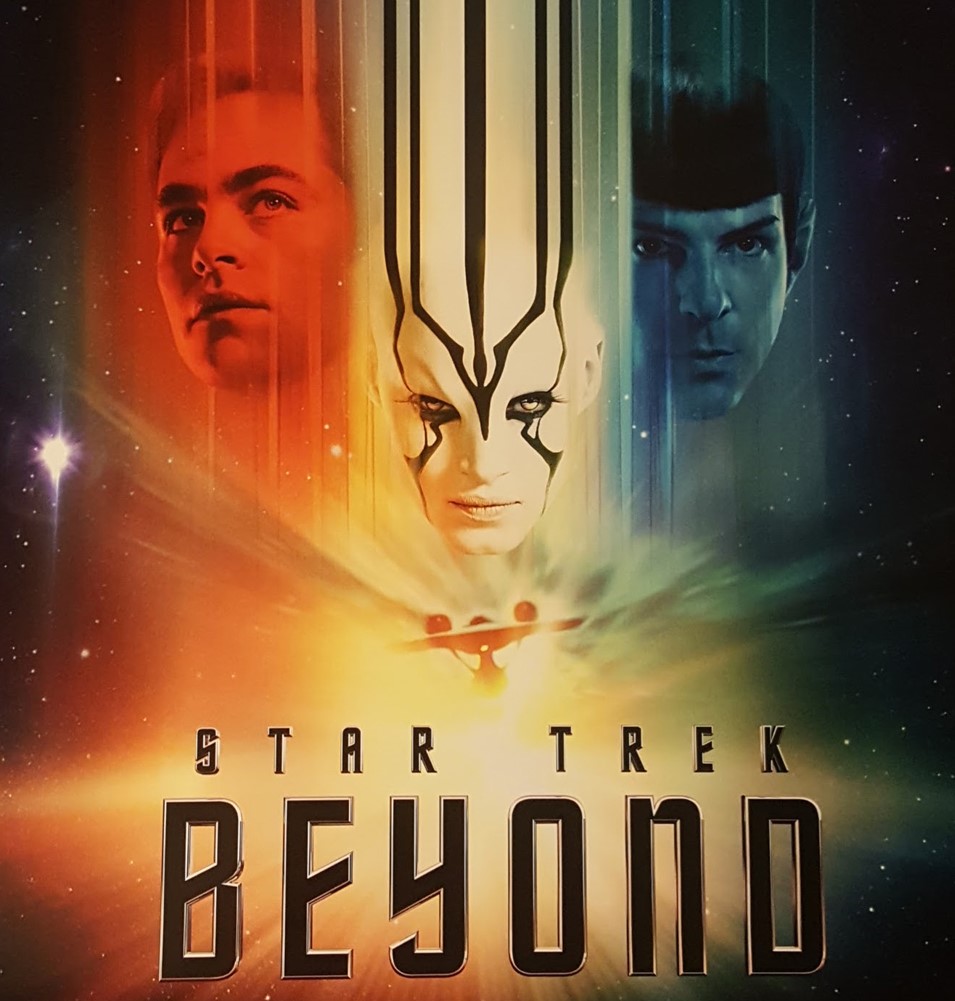
I'm still sad, but this movie was a good salve
I've been pretty dang depressed this last week. Losing Pixel has been hard, and when things start to level off into a sense of "normal," I'll run across a clump of her fur between couch cushions or something, or just realize that my big new condo feels really empty without my lovely ball of fur and attitude running around it. It's kind of refreshing in its way, because being depressed when there's a clear, external reason to be depressed is a kind of novelty for people like me that take medication to keep the personal black hole that follows them around at bay. But I am working my way through it. Still procrastinating on some things, but starting to get other things done and putting my mind to positive things. Intermittently.
One coping mechanism this week has been one part lazy/one part distraction/one part mood-enhancer, and that's movies. I've watched a few movies this week. Erik suggested one, People, Places, and Things, about a cartoonist with a fucked-up love life. He thought I'd relate. He was right. It's a nice little movie. I also watched Irreplaceable You, which is about a character dying, which I thought might be good perspective but just turned out to be sad (though Christopher Walken has a fun curmudgeonly supporting role). Also Laggies, about a directionless 30-ish woman who backslides into adolescent habits, which I rather enjoyed. But also some good old reliable "comfort food" movies: Spider-Man Homecoming (as fun as I remembered), Thor: Ragnarok (funnier than I remembered), Guardians of the Galaxy Vol. 2 (fun, but too dumb/shallow for repeat viewing and more violent than necessary), and tonight, Star Trek Beyond.
I'd watched Beyond once before since it left theaters, and liked it well enough but maybe not as much as I did when I first saw it. This time I give it a lot more credit. Simon Pegg and his writing partner (whose name escapes me at the moment) pulled off something really impressive: They made a movie that has the modern-studio-mandated action set pieces and spectacle that also has a solid Star Trek story. It is much better than the 2009 J.J. Abrams Star Trek and a billion times better than the idiotic mess that was Star Trek Into Darkness. Granted, that's a low bar.
Still, it's a really enjoyable movie. It has its issues—Captain Kirk is really stupid in one critical point, something that could have been avoided with a few lines of dialogue to propel the story/action without making him an idiot—and the Villainous Plot™ has a MacGuffin (two, actually) that doesn't have enough explanation to make any sense. (Oh, and a motorcycle? That's 100+ years old and runs great and has fuel in it? Really? OK, I'll let that one go.) But the villain at his core has a nice backstory (not well-developed enough, but points anyway given the need for ACTION SPECTACLE), the story flows well, our heroes are handled (for the most part) well. And the in-jokes/callbacks/homages are organic and serve the story (unlike in Into Darkness, where whole sections of the movie are poorly done callbacks/recreations there for no reason except to be callbacks). And they're funny. Simon Pegg does subtly funny really well.
It's a shame it didn't do the box office business its immediate predecessors did. But as Erik has pointed out time and again, a sequel's ticket-selling success is largely based on the quality of the previous movie, not its own. And STID, let's be generous here, sucked. But there may not be a follow-up to this one. Which might be OK. Star Trek is not nearly its best when treated as an action franchise, and that's what Paramount Studios seems to think these movies need to be, and the rumor mill has a possible sequel written or co-written by Quintin Tarantino, of all people. Hard. Pass.
Anyway, Beyond is a fun movie. I liked it (again). And it picked me up a little bit.
No Comments yetSTS-51L
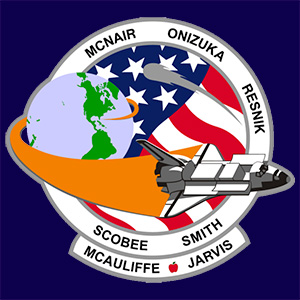
Space Shuttle Challenger - 1/28/86
As a futurist/sci-fi nerd kid, there were two ways one could've gone when it came to following the space program: rapt attention and obsessive cataloging of every development and mission, or a blasé acceptance of its ordinariness and general disappointment in the lack of "real" progress in every development and mission. By the '80s, I was in the latter camp.
In late 1985, when I was 16, things at my school were a little bit space-happy because the principal, Sr. Judy (yes, my school was run by nuns, though they were rather unconventional nuns), had applied to and was a finalist for the teacher-in-space project. She had a shot at being on the January '86 space-shuttle flight (she would ultimately lose out to Christa McAuliffe). So it became a thing, lots of NASA-based stuff being taught and a mock space shuttle was built for students to go on "missions," which would parallel actual shuttle missions and approximate some of the astronauts' experiments and other educational goodness as well as give the experience of living in a confined space for days, just like the astronauts—except for the pesky gravity, which kind of ruined a lot of the approximation stuff, but still it was a great thing.
I, however, was in some ways already living in the future, being a sci-fi nerd and Star Trek expert, and was even teaching a course on Star Trek to my fellow high-schoolers (based on a college course I read about that tackled philosophical and scientific questions and issues presented in the episodes). Space shuttles were old hat. Primitive, even. Wake me when there's warp drive.
So, on the morning of January 28, 1986, while most of the school was gathered around a TV and a "crew" was in the mock space shuttle, monitoring the launch of STS-51L, I wasn't with them. I was in a smaller room, with a group of a dozen or so others, introducing Episode 5, "The Enemy Within," ready to engage in a discussion on the makeup of personality, whether traits are inherently "good" or "evil," and whether one needs the unpleasant elements of humanity to be a functioning whole person.
Just as the transporter malfunctioned and split Captain Kirk into two people, someone burst into the room and said "the shuttle blew up."
It was a stark reminder that this old-hat, primitive stuff was still, in our real world of the 1980s, the frontier.
We abandoned the Enterprise for the day and I spent the next several hours doing what I could to improve the TV reception and follow along while the school debated whether or not to continue the mock shuttle mission (they did) and ponder Sr. Judy's good fortune at not being chosen for Teacher in Space. Also figuring out what O-rings were and trying to fathom why we depend on such fragile materials for things like a spacecraft.
Anyway, Challenger is in some ways my generation's "where were you when Kennedy was shot" moment; it arguably stalled NASA and set back space exploration for years, and remains a potent moment in personal history.
So. Here's to the crew of STS-51L. May we keep on exploring and advancing, and risking, out into the big black, boldly going where humans have yet to go.
No Comments yetDisco Fever
Now that we've hit the halfway mark in the first season, some more refined thoughts on Star Trek: Discovery.
Short version: I like it, it is proving to indeed be good Star Trek as well as good sci-fi, though the "spore drive" that much of this season relies on stretches the "sci" part of things pretty far.
Longer version follows...
See full post: "Disco Fever"...
Discovery Phase
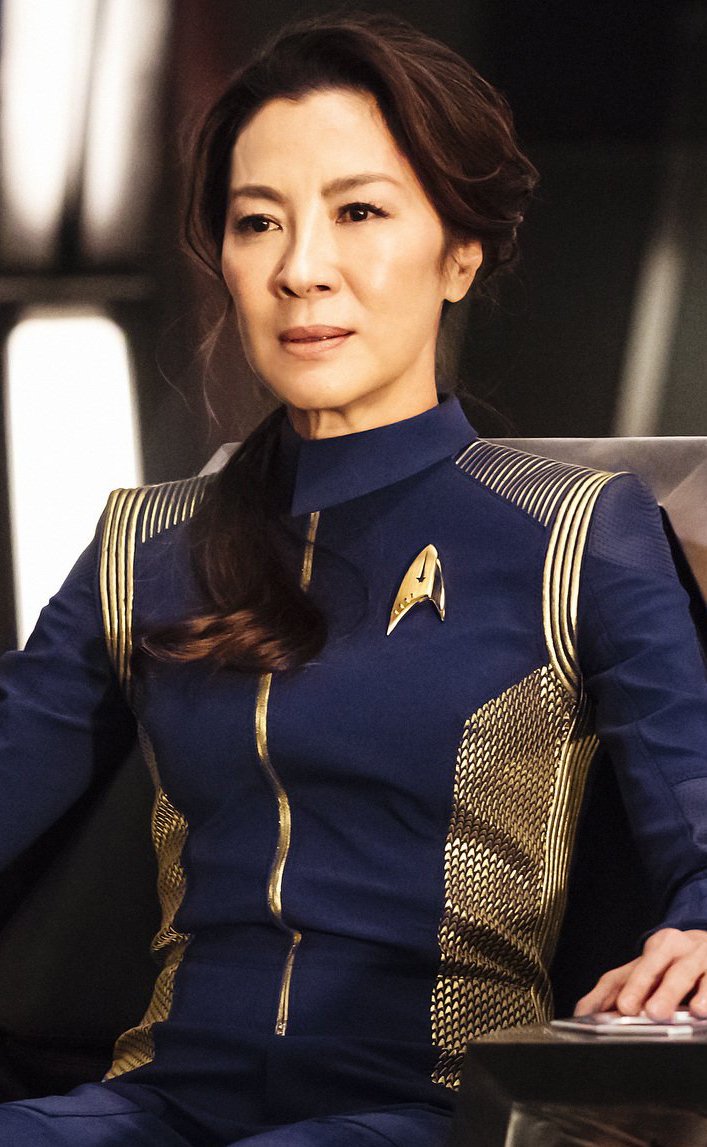
Michelle Yaoh as Captain Phillipa Georgiou
So, tonight Star Trek: Discovery premiered. First Trek on TV since 2005 and first to be distributed via internet (the first episode on over-the-air CBS in a "first one's free" strategy, behind the CBS Internet paywall thereafter). The leadup was a bit chaotic, with personnel changes and debut delays and a total prohibition on advance reviews of any kind. Expectations were ... let's say moderate.
In some ways, it didn't disappoint. Production values were off the scale. Visually striking, detailed, and I was especially geeking out over the sound effects in the background. Performances mostly good.
In other ways, it rankled, but in minor nitpicky fashions; continuity discrepancies between other Star Trek series, Treknological/scientific liberties that could've been avoided with more attentive writing, that sort of thing.
And in the most important ways, it left me ambivalent. I'll need to see how the story develops to form an opinion on the basic identity of the show and its fidelity to Star Trek ideals and its overall strengths. I think it's a failure of a pilot to leave that much ambivalence, but there's plenty of potential for redemption. What little has been reported about subsequent episodes suggests episode 3 begins a somewhat lighter tone as the titular ship and crew are introduced.
Things I liked:
- Michelle Yeoh as Captain Georgiou. Yeoh presents a complex character of ideals, confidence, compassion, and gravitas, and does it very well. (Spoiler: Too bad she doesn't survive episode 2, hopefully we'll see more of her in flashbacks.)
- Doug Jones as Lt. Cdr. Saru. Saru is an alien of a type we haven't seen before, and both his racial background and his individual demeanor are interesting. He comes from a planet where his species is/was livestock to another species, which is kind of fascinating, and as such his response to potential danger is most often to flee, instinctually preferring the flight aspect of fight-or-flight heavily. He's also caustic and a bit brazen, and he's a science officer, making him kind of a Spock/Bones hybrid character. Clever.
- Design. Mostly. As I said, the visuals are rather impressive and the care that went into graphics and background sound is admirable. There's a touch too much JJ-verse influence on the bridge of the Shenzhou (complete with occasional lens flare), but not enough to distract.
- The "feel" of the culture on Georgiou's starship Shenzhou, which is laid-back yet professional, casual yet disciplined. Captain Georgiou would be fun to work for.
- Starfleet sideburns on the men. Yes! In your face, JJ Abrams.
Things that left me raising my eyebrow Spock-like in a skeptical-not-amused way:
- Our lead character, Commander Michael Burnham (Sonequah Martin-Green), is somewhat unlikable. This may well change, but in the pilot episodes she makes some decisions that are simply too contrary to what we're supposed to believe about her as a character to make her sympathetic. We're apparently supposed to be left thinking she was right and did what she did for good, sensible reasons, but it doesn't fly with me. (Spoiler: It may well have been logical to want to show immediate force when encountering Klingons to get them to respect you, making a kind of effort to speak to them on their cultural grounds, but (a) that's counter to what she's supposed to believe in; (b) she was raised in Vulcan culture and as such would expect to err on the side of pacifism; (c) she's supposed to have this awesome mentor-mentee bond with Georgiou that she completely betrays as if it's of no consequence; (d) the history she's basing her course of action on is from pre-KirShara reform days on Vulcan, which may not be strictly relevant, but does play into its ethics; and (e) it rather predictably would play right into the Klingons' hands, and though she wouldn't be aware of the specific Klingon machinations here, they already have a working theory that they were lured here for a confrontation and she is sufficiently forward-thinking [supposedly] to plot out a few moves ahead and realize engaging Klingons violently would be counterproductive to Federation interests. She thinks she was totally in the right, and I think we the audience are supposed to think that too, but really she just fucked up and betrayed her friend and mentor out of recklessness. The war may have started anyway, but her decidedly un-Vulcan bullheadedness did not help avert it.)
- James Frain as Sarek. I'm cool with using the Sarek character here, and he was written well enough, but Frain didn't fit the role. Frain is a fine actor, but he does not remotely evoke
 Mark Lenard (original portrayer of Sarek) in appearance, cadence, expression, really anything, nor does he bring anything new to the role to distinguish himself from Lenard (or Ben Cross, who played the role — badly — in the JJ movies). As my friend Mark pointed out as we were watching, it is rare for any actor to play a Vulcan well; we came up with only the Big Three Vulcan actors who've successfully pulled it off, not counting Zach Quinto's JJ-verse Spock — Lenard, Leonard Nimoy (obvs), and Tim Russ, who was in some ways channeling Nimoy. I added Gary Graham, whose Ambassador Soval became pretty decent by the end of Enterprise's run, and gave special dispensation to Jolene Blalock's T'Pol due to the writing she was given (mostly good, but often given "reasons" to be un-Vulcanlike) and Kim Catrall, who had the unenviable job of playing an atypical Vulcan pretending to be typical. Not one guest-Vulcan did it well. (Well, maybe Dame Judith Anderson in a rather small role. And Robin Curtis put in the effort.) Even Celia Lovsky's original T'Pau was a bit like your old grandma who's cantankerous and a bit racist but you tolerate it because she's old and will die soon. It's a difficult task, and not even the best actors are always up to the challenge. But with Sarek being such an important character, it's disappointing to have a subpar performance in the role.
Mark Lenard (original portrayer of Sarek) in appearance, cadence, expression, really anything, nor does he bring anything new to the role to distinguish himself from Lenard (or Ben Cross, who played the role — badly — in the JJ movies). As my friend Mark pointed out as we were watching, it is rare for any actor to play a Vulcan well; we came up with only the Big Three Vulcan actors who've successfully pulled it off, not counting Zach Quinto's JJ-verse Spock — Lenard, Leonard Nimoy (obvs), and Tim Russ, who was in some ways channeling Nimoy. I added Gary Graham, whose Ambassador Soval became pretty decent by the end of Enterprise's run, and gave special dispensation to Jolene Blalock's T'Pol due to the writing she was given (mostly good, but often given "reasons" to be un-Vulcanlike) and Kim Catrall, who had the unenviable job of playing an atypical Vulcan pretending to be typical. Not one guest-Vulcan did it well. (Well, maybe Dame Judith Anderson in a rather small role. And Robin Curtis put in the effort.) Even Celia Lovsky's original T'Pau was a bit like your old grandma who's cantankerous and a bit racist but you tolerate it because she's old and will die soon. It's a difficult task, and not even the best actors are always up to the challenge. But with Sarek being such an important character, it's disappointing to have a subpar performance in the role. - Burnham leaving the bridge during crisis to call home, even if it was to ask for specific info about dealing with Klingons. Paints her in a bad light, and besides, it's dramatically unnecessary. She could have known this bit of history already (might have actively sought it out much earlier given her Klingon-related trauma, and that could have been integrated as part of her flashback sequence).
- The reimagined look of the Klingons. I've read somewhere that the series will over time show us greater variation of the species than we've seen previously, but right now it just seems like the Klingons have a new look just because this time there was more money to spend.
- The music. The opening theme is quite forgettable save for the Alexander Courage fanfare and carries nothing of the splendor found in Jerry Goldsmith's, James Horner's, and Dennis McCarthy's respective themes. Maybe it'll grow on me. Also, the opening credits visuals are different — not bad different, I actually like the storyboardish style — but a little jarring, at least at first.
Things I cringed at, at least a little bit:
- The Klingon scenes. My late friend Scott was a big fan of all things Klingon, and I know others are too, but they were never among my favorite Trek cultures, so maybe that informs my relative lack of interest in the scenes on the Klingon ship; highly expository, and in subtitled Klingon spoken haltingly by actors through prosthetic teeth, these bits give important setup information for what's to come, but are just not compelling. One of the Klingons, Voq, is mildly interesting as an outcast wanting to prove his worth, but the rest are, to this point, kind of cardboard.
- The aforementioned scientific/accepted Trek-lore writing laziness:
- The Klingon fable played out by our villains involves a giant beacon that lights up bright as a star to signal all the heads of important Klingon houses to meet. Signaling across light-years with, well, light is a long-term proposition and completely ill-suited to bringing anyone to you within a handful of centuries. Yes, there were additional components to the signal that shook and vibrated the Shenzhou's superstructure, but the idea was that it was a literal beacon. The light from which was useless. Oops.
- Technological anachronisms. Holographic two-way transmissions, even in real-time across light-years? The "new" holographic communicator was used a couple of times in Deep Space Nine to reasonable effect, but here — 100-plus years earlier — the tech is way more elaborate and serves zero story purpose. In and of itself, it's fine, but as an anachronism that could have been easily avoided it takes me out of the flow of the story. And Klingons with a cloaking device. It wasn't called that and it was implied that it was unique or at least uncommon, but Klingons don't get cloaks until they trade with the Romulans for it later on.
- The mind-meldy conversation between Burnham and Sarek was bothersome not for its content (which was actually quite good), but for its utter non-believability and for exacerbating the real-time-holographic-transmission issue as it rendered that prior bit somewhat redundant. The only similar type of established telepathy with Vulcans is a psychic link between bonded sexual couples, and borrowing that and explaining it away with a "katra" mulligan (contrary to earlier uses of katra mulligans) was irksome and a little icky given Burnham's familial relationship with Sarek.
- The background bridge character that was ... a robot? Cyborg? Weird augmented alien with a full helmet display head? A refugee from Star Wars or the JJ-verse. In the words of V'Ger's probe, "this device serves no purpose."
- I'll swallow it, but the (understandable) retcon of using what becomes the Starfleet-wide delta insignia as the Starfleet-wide iconic image 15-20 years too early, in an era in which we know it is linked exclusively to the starship Enterprise, is a nitpicky nerd-gripe that I will have to explain somehow in my internal head-canon.
- And finally, too much emphasis on action and gee-whiz-neato look-what-we-can-do effects (which, as I said, look great) at the expense of theme and substance. In the absence of the full story and most of the regular characters, this is perhaps an unfair criticism and may change with context. Hopefully it will. But as a pilot it's odd to give this sort of thing short shrift.
Potential here is vast, and it's more solid as a production (even allowing for budget/tech inflation) than The Next Generation's pilot, but with Star Trek I always expect on some level to be, if not overwhelmed, satisfactorily whelmed; DS9's pilot was very good, Enterprise's had flaws but gave a fine foundation, Voyager's was...well, it was much better than what followed. But Discovery's jury is still out, at least until next week.
UPDATE: TrekMovie has a decent recap/review up now that's worth a look. It is spoiler-heavy, though, so beware.
No Comments yetThe Occupation Begins

Well, here we are. Day One of the Trumpocalypse. For two-and-a-half months we've been anticipating this day with anxiety of epic proportions. Just what are we in for now? And will we survive it?
One of the few amusing things about the election results is the general consensus of the nerdosphere on social media that the 45th president is basically Gul Dukat, the principal villain on Star Trek: Deep Space Nine. It is remarkably fitting; Dukat even made the claim that he was sending his people into the ruinous clutches of a hostile foreign power in order to "make Cardassia strong again" (he may as well have said "great"). Gul Dukat is a narcissistic, autocratic, brutal oppressor who fools people with smarmy charm, all the while believing fervently that he's the hero, and that true victory is not vanquishing your enemies but "to make your enemies see they were wrong to oppose you in the first place. To force them to acknowledge your greatness." He was even a cult leader for a time. There are at least ten Dukat Twitter accounts that conflate the Cardassian dictator with Mr. Trump. The best is Joe Sondow's @realRealDukat, that copies tweets from @realDonaldTrump with small edits to substitute Dukat for Trump and other DS9 terms for real-life ones:
Though Dukat was eventually deposed and his successor ultimately defected to the good guys, by the end the planet Cardassia Prime was war-ravaged and in utter ruins. May fact play out better than fiction.
The analogy isn't perfect—Gul Dukat is smart and has a knack for oratory, while Trump can't properly read or string together consecutive coherent sentences. But we'll call that artistic license.
With all this in mind, here's my latest sketchbook entry.

Grokking Spock
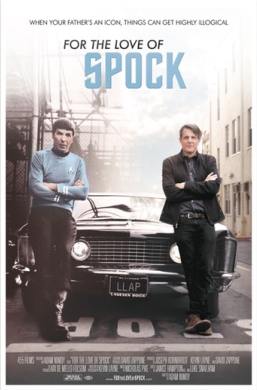
Playing theatrically for a brief run in select markets and available now online at various sites (for a few bucks)
Some friends and I took in a theatrical showing of Adam Nimoy's new documentary film about is father tonight. "For the Love of Spock" was originally conceived as a partnership project between Adam and Leonard Nimoy before Leonard's death in March 2015; the endeavor naturally changed in tone and scope after that and became a perhaps less-focused but more expansive look at both the character of Spock and the man who portrayed him.
It's a good film; not being a documentary aficionado, I can't speak to its merits compared to other documentaries, but it's enjoyable, informative, touching, and interesting, which I think is as much as one can ask of such a project. Being the nerd that I am, I already knew a lot of what is covered in the film. But having it presented from the perspective of Leonard's son gave it a new twist and revealed some new tidbits and clarified some things that were only hinted at in "the official record," if you will. (It also includes, over the end credits, a cover of David Bowie's "Starman" performed by Leonard's grandson and his band, and it's really good.)
Before the screening, there was a live-via-Skype introduction and Q&A with Adam Nimoy himself, which was kind of neat. He said that when originally conceived the film was to be 100% about the character of Spock, but after his dad's passing it morphed into more of a look at Leonard Nimoy in and out of Star Trek, but really, I think, it became more about fathers and sons, as personified by three generations of Nimoys. A powerful narrative device has Adam reading a letter to him from Leonard written in 1973. He reads the letter in chunks that are interspersed throughout the film to good effect, shedding light on a difficult relationship between the two; I wanted to see something similar from a later point in time to similarly offer insight into a later estrangement they had more recently, as there is a lot of referencing of troubles without much specificity. But I suppose the specifics aren't important for us as the viewing audience. There's only so much we can expect of an internal family drama to be brought out for all to see, and there's still a lot here.

Adam surprising his dad on the set, 1966
The one part of Leonard Nimoy's life covered in the film that I didn't have a decent knowledge of was his alcoholism, and having recently lost my mom to exactly that, I find myself more interested in that aspect of his history than I'd been before. I had gleaned from various writing over the years that Leonard began drinking heavily around the end of Star Trek's production years -- probably helped along by the stressful and unfulfilling third season (there's another documentary in that) -- but I had not realized that he managed to continue to function and keep it in check for as long as he did before it became overtly destructive; I had assumed he'd beaten it back during the '70s, which turns out to not at all be the right timeframe. It makes me wonder if my mom had a similar experience, hiding it successfully and continuing to function for a good long time before it took her over completely.
Leonard eventually did beat it, but not until the late '80s or so, after he began his second marriage, which was stunning to me. There are interview clips in the film that I had somehow not seen before in which he openly discusses it; in the exhaustive world of fandom where nerd tenacity and celebrity heroes intersect, it's hard to keep anything under wraps, but somehow this was never part of his public profile. Perhaps because his version of alcohol abuse didn't result in obvious or public poor behavior, or because throughout it all he still managed to be Leonard Nimoy, brilliant actor/director and font of thought and creativity, at least publicly.
Interestingly, there is little mention of Nimoy's photography, which was his focus after he was mostly done with Hollywood. There's some bits near the end of the film, and some images from his body-image project of about 10 years ago, but it's kind of a footnote to the movie.
I guess that makes sense, though. As Adam Nimoy said in his introduction, there was just so much that had to be cut to keep the film under two hours long, and obviously little or none of the Star Trek stuff was going to be lost. Or, as Luke Thompson put it in his review of the film for Forbes, the movie "feels like it’s barely nerve-pinching the surface. For fans, a Ken Burns-style multi-hour miniseries may be needed when it comes to Star Trek as a whole, or even Nimoy in particular."
I'd watch that. Hell, I'd help make that. Anyone know Ken?
"For the Love of Spock" is available online at Vudu, YouTube, and other outlets; through iTunes; and on demand via DirecTV, Comcast, TWC, and other providers.
No Comments yetNon-Standard Oribt
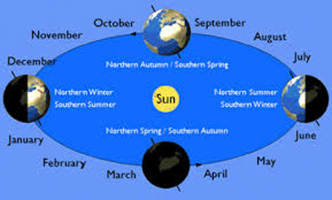
Cosmically speaking, it was just a regular ol' 365.25-day circuit. Not so much down on the ground.
Labor Day weekend again. That was fast.
Also, man, what a long year it's been.
Today would have been my grandfather's 95th birthday. It's also two days shy of the first anniversary of my mom's death. Makes for a depressing occasion. I miss both of 'em, in different ways and for different reasons. And the same reasons. It's kind of muddled. But this is the closing hours of the year 1 After Mom, so that's where my head's at. I watched "The Visitor" entry of DS9 last night and found myself bawling my eyes out at the end. Because, hey, it's a touching episode on its own, but it takes on a different significance for me now than it did every other time I've seen it.
The past 12 months have been an education in the ways of bureaucracy, in cultural collisions, in frustration with society, and many other things, but mostly it's been a blur of grief. Both overtly expressed and buried under anger and frustration.
My mom died from completely preventable causes, and that makes me mad. It was her own fault, which makes me madder. At the same time, it kind of wasn't really her fault, which confuses me. And it's taken most of a year to get to a point where I can just feel sad without the rest of it.

"The Visitor" has a different edge to it now
She also left me in charge of things, which I have had mixed feelings about. (My step-father was still around at that point, but he had Alzheimer's, so I got put in charge of him too, at least so far as money and practicalities were concerned; he died eight months later, which if I'm being honest is a mixed bag. It's sad and I'm sorry to not get to see him again, but it spared him living with the end stages of Alzheimer's, which would have been hell.) I had no idea a year ago what it meant to be left in charge, what I would be tasked with in any real way. Nor did I have a clue as to the logistical hurdles society had erected in place for people in my position, or the closer-to-home internecine warring that would occur with extended family. I learned a lot. Not all of it positive, but learning is learning. And it's not done with, either, some of those hurdles are elaborate and arbitrary and exist to make people in my position tear their hair out and scream at functionaries that have no power over the situation while they place more and more creative obstacles in their paths.
Meanwhile, the Earth turned and went about its merry way orbiting the sun, and more happened. I learned that another long-term association wasn't what I thought it was, my cat got sick again, and yet more dental trauma hit my jaw and my wallet, all of which was well in keeping with the mood of the orbit. On the other hand, my dad had heart surgery, which you might not think of as a plus, but the result has been exceptionally positive, so score one for the forces of good. And perhaps as important as anything else, I was able to reconnect with someone whom I'd been close to but had drifted away, and with luck and effort will keep her in my personal orbit better than before. So, not all bad, to be sure.
Still, it's not a year I'd care to repeat. If Al and Ziggy Quantum Leaped me back to September 2015 I would be very displeased. No, I prefer to turn that page. Move on to another turn 'round old Sol, and see what the next orbit brings my way. Hopefully things I'd like to revisit, should I someday find myself by an Atavachron.
No Comments yet

